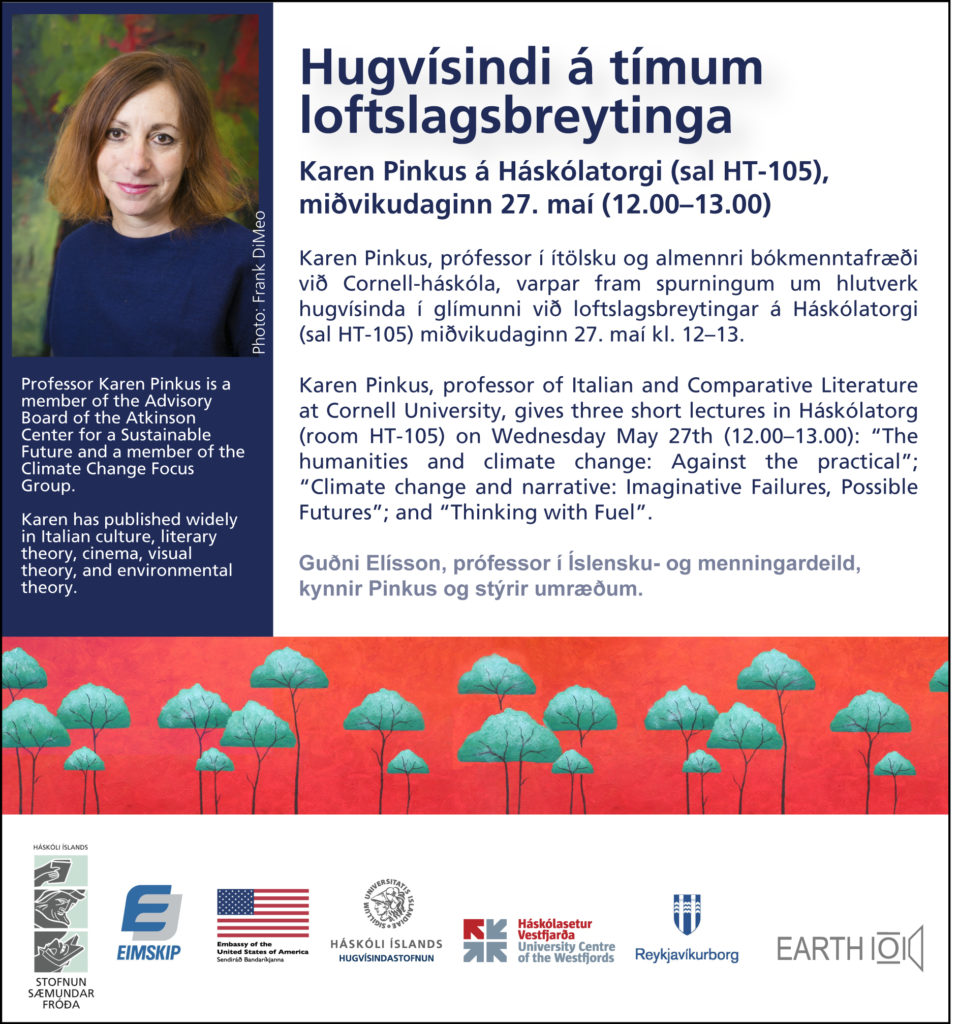2013-2017
List of earth101 conferences
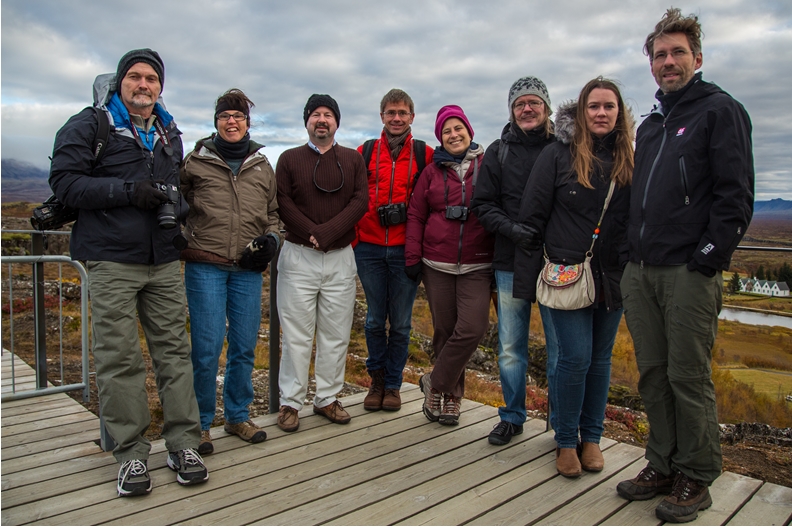
2017
October 23rd 2017 – University of Iceland Reykjavík
Democracy and Climate Change: Past Failures, Present Opportunities, Future Threats
A confernece moderated by professor Jón Ólafsson with lectures by Frederic Hanusch and Christian Parenti.
Frederic Hanusch did his Dr. phil. as part of the research group “Democracy and Climate Change” at the Institute for Advanced Study in the Humanities in Essen (KWI). He worked from 2013-2016 at the German Advisory Council on Global Change (WBGU) and has since 2016 been a part of the project “Futurisation of Politics” at the IASS, the Institute for Advances Sustainability Studies at Potsdam. His research is focused on a combination of democracy research, global change research and the study of time. His most recent publication is Democracy and Climate Change (2017) published in the Routledge Global Cooperation Series.
Christian Parenti has a PhD in sociology (co-supervised in geography) from the London School of Economics and is a professor in the Global Liberal Studies Program at New York University. His latest book, Tropic of Chaos: Climate Change and the New Geography of Violence (2011), explores how climate change is already causing violence as it interacts with the legacies of economic neoliberalism and cold-war militarism. The book involved several years of travel and research in conflict zones of the Global South.
Christian’s current research focuses on the environmental history of state involvement in American economic development, from the earliest days of the republic onward. As a journalist, he has reported extensively from Afghanistan, Iraq, and various parts of Africa, Asia, and Latin America. His articles have appeared in Fortune, The Washington Post, The New York Times, Middle East Report, London Review of Books, Mother Jones, and The Nation (where he is a contributing editor). He has also helped make several documentaries and has won numerous journalistic awards, including the 2009 Lange-Tailor Prize and “Best Magazine Writing 2008” from the Society for Professional Journalists. He also received a 2009 Emmy nomination for the documentary Fixer: The Taking of Ajmal Naqshbandi.
Democracy faces climate change: Prospects and consequences Experiments in Democracy, final workshop, 19-21 October
Democratic decision-making often depends on rhetorical power. In order for the demos to make the right decisions, the less knowledgeable must be convinced by those who know more or claim to know more. This is one of the main challenges of democracy: How can we be sure that those who know less will listen to those who know more rather than to charlatans who claim to know more but do not or to those whose motives may have little to do with the common good?
One of the limitations of democracy – a limitation often used to show that democracy is a complicated phenomenon – comes from public ignorance. Many of the decisions that democratic governments must make, have complicated long-term consequences. Most people lack the knowledge to work out the causal factors to understand the effects of policies and therefore may not be able to make the distinction between better proposals and worse. They must trust other people.
Climate change is the greatest challenge of the world today. It also presents a formidable challenge to democracy because in order to respond to it, decisions must be made and policies changed without immediate benefits and in some cases demanding considerable short-term sacrifices. The consequences of climate change are also a grave threat to democracy: In a world where climate change has disrupted economies, undermined political leadership and created environmental disasters, democracy as a social organization may fail to resist authoritarian forms of control based on brute force rather than on gaining public support for policies.
The workshop will discuss democracy from these two perspectives:
How can/does democracy (today) deal with climate change? What prospects can democracy offer in the struggle to bring policies in line with realities: Can democratic publics or democratically elected leaders respond to climate change forcefully enough to affect the environmental course the world is already on?
What is the political fate of a world that has failed to rise to the challenge of climate change? We need not even take the worst future scenarios to imagine a truly dystopian future. Is there a future for democracy if democratic governments seem unable to respond to clear and immanent environmental disasters caused by man made factors?
In addition to participants in the project we will invite people with research focus in democratic theory or climate policy. The workshop itself should take up Thursday 19th and Friday 20th with additional public lectures scheduled for Saturday.
Thursday 19 October
10.00-11.30 Christian Parenti
Storm Socialism and the Survival of Democracy.
In the United States, the political economic effects of catastrophic storms are already unfolding. But what are the implications for democracy, economic growth, and the possibility of social democratic redistribution? To answer these questions we need to understand the state’s actual role in the history of American economic development. Far from being a product of laissez-faire economics, the US economy has always involved very robust state action. In reality, the American government was one of the original developmentalist states. And the state remains heavily involved in shaping the economy. Throughout American history, crisis and catastrophe have played an instrumental role in calling fourth the state to transform the capitalist economy by means of semi-socialist policies. Might the onset of climate change and the new urban crisis it threatens be another such moment? Perhapse the climate crisis, by demanding adaptation and mitigation, contains latent progressive possibilities? It is not inconceivable that a type of “storm socialism”, a new of redistributive and enviormentally transformative political econmy of justice, emerges from the climate crisis. However, such a path would require that grassroots social movements become more sophisticated, imaginative, and agressive. Crutially, social movements will have to break their dependence on funding from large philanthropic foundations.
11.30-12.15 Guðrún Elsa Bragadóttir
On the Need to Fail: Agency and Alternatives in the Age of Climate Change.
The paper will address environmentalists’ resistance to the search for oil currently under way in the Dreki region out of Iceland’s north coast and explore the importance of ‘inaction’ in the context of Italian philosopher Giorgio Agamben’s concept of potentiality. Demanding that corporations and governments to suspend their short-term goals of accumulating profit amounts to demanding that they fail when it comes to accomplishing the goals of normative, capitalist society. The ideological power of those goals becomes manifest in the lack of response to analysis of global warming and its causes. This inability to react in the face of the scientific consensus on climate change will be discussed in the context of queer theory; Eve Kosofsky Sedgwick’s work on what theory can do to affect change in the world, as well as Jack Halberstam’s ideas on the importance of ‘failure’ within a heteronormative framework that does more harm than good
Lunch
13.00-13.45 Salvör Nordal
Climate change and public participation. Some challenges to democracy TBA.
13.45-14.30 Alfred Moore
Consensus and Conspiracy in the Politics of Climate Science.
It is often suggested that political ignorance undermines democracy. Debates and policies on climate change are exhibit A for the prosecution. However, I will suggest that the story is more nuanced. In complex societies, we cannot avoid being enmeshed in webs of ‘epistemic dependence’, and face choices about whose voices to take as authoritative in particular contexts. A feature of democratic politics in many western states over the last half century has been a decline in deference to experts of various kinds, and a broad empowerment of people and groups to contest claims to expert knowledge. This is in many ways to be welcomed, but it creates a distinctive problem: how to we generate authoritative expertise in a context of empowered critical citizens and a wide range of alternative positions. One solution to this problem has been the appeal to consensus (98% of climate scientists!) and the development of a novel international institution designed to construct and promote a consensus on the science of climate change. In this essay I analyse the appeal and the problems of the reliance on consensus, and explore the ways in which consensus has itself been problematized. Democracies, I conclude, do have a problem, but it is not primarily one of public ignorance; it is rather to do with the distinctive ways in which the contestatory environment of democratic politics can go wrong.
14.30-15.15 Lars Binderup
Climate change denial and freedom of speech.
Recent decades have seen increased commercialization of the news media and polarization of news coverage. In addition, the average voter is now likely to get an important part of their information from social media as opposed to mainstream public news channels. Whereas the advent of the internet and social media is often – and with some justification – hailed as an empowerment of the people against elites and repressive regimes, these new technologies and a polarized press have evidently also become instruments for disinformation and the spread of prejudiced and ignorant views. The spread of climate change denialism is a prime example of this, but so are for example skepticism about vaccination programs, Brexit and Trump. Democracy depends for its viability and legitimacy on the existence of educated and well-informed citizens that are able to articulate their values and interests competently This in turn presupposes that news media provide accurate and balanced information about issues relevant to public policy including scientific knowledge. The paper argues that the future of democracy depends on a strengthened focus on the epistemic preconditions of a well-functioning democratic process. New measures (forms of epistemic paternalism) may have to be introduced. (Some (Lavik 2016) have even suggested a ban on climate change denial). But, the paper also takes a first look at possible negative human rights implications of such measures, especially with respect to free speech.
15.30-16.15 Guðni Elísson
Climate change, democracy and the good we seek.
In order to achieve the goal of keeping emissions under the 2°C limit, the global community will have to get ambitious carbon reduction bills passed. How likely are we to succeed in doing so if it is virtually impossible without some dramatic measures regarding energy consumption? And how likely are the politicians to go against the public will if it is fuelled by immediate self-interest and the counterarguments provided by the denial industry? Looking at the data, it is obvious that democratic societies will most likely be unable to stay below the 2°C limit, given the timeframe we have left to solve the problem.
16.15-17.00 Grigori Pasko & Helga Brekkan
To whom the truth is told.
Despotism and environment in Russia. Followed by a film screening
17.30-19.00 Film screening
Pasko the Journalist: The Dissident.
Grigory Pasko – the Ukrainian-Russian journalist and former prisoner of conscience, has for years been an active critic of the Russian government and has concerned himself with environmental issues in particular. The Documentary The Dissident covers ten years of Pasko’s work, after he started his journalistic investigation of Nord Stream – a project to build a huge gasline from Northern Russia through the North Sea and to Western Europe. Pasko’s critical discussion of Nord Stream has put him in opposition to the Russian authorities and his fight to save independent critical journalism in Russia has exposed many of the worst sides of Russian authoritarianism. The reaction to his work also raises questions about the willingness and capability of the Russian state to face some pressing contemporary problems such as climate change.
20.00 Dinner
Sumac restuarant, Laugavegur 28
Friday 20 October
10.00-11.30 Frederic Hanusch
The Influence of Democratic Quality on Climate Performance in Democracies.
Taking a look at established democracies separately, some appear to be more successful in dealing with climate change than others. Yet the characteristics of climate change and the unintended consequences of democracy might contradict each other to different degrees, e.g. some democracies perhaps find better solutions than others to overcome their short-termism, in order to be able to better deal with the long time horizon of climate change. Hence, different levels of democracy might be an explanatory factor for differences in the climate performances. Beginning by outlining a concept of democratic efficacy, the talk provides an empirical analysis of the influence of the quality of democracy on climate performance across democracies. The specific case study of Canada’s Kyoto Protocol process is then used to explain the mechanisms of democratic influence in depth. It will be shown that overall stronger democratic qualities tend to lead to improved climate performances.
11.30-12.15 Jón Ólafsson
Seeing and believing: The epistemic challenge of climate change.
The distinction between a doxastic and epistemic character of democracy can be used to show that in an important sense democracy is not (at least not directly) about knowledge. Public deliberation aims at consensus but at the same time admits that full consensus is not necessarily desirable. Democratic deliberation is one means to establish democratic authority where a minority accepts a decision made by a majority because it agrees to a process. The problem of climate change evades this analysis since a proper response to climate change depends not on opinion but on knowledge. The talk will discuss whether the doxastic/epistemic mixture of climate politics is too toxic for democracy to resolve.
13.00-13.45 Maija Setälä
The Politics of Non-Existence: Defending Future Interests in Democratic Deliberation.
Inclusive forms of deliberation, i.e. processes of reason-giving, can be expected to correct individual biases of reasoning and enhance consideration of others’ interests and perspectives. Deliberative processes have also been regarded as a potential way to enhance consideration of outgroups’ interests even when they are not represented in the process. However, there are influential studies emphasizing the importance of ‘the politics of presence’ (Philips 1998), i.e. representation of diverse identities rather perspectives in a more abstract sense. When it comes to collective decision-making affecting future generations, the problem is not that of non-presence but rather that of non-existence. This calls for further measures to ensure the representation of future interests in democratic deliberation. These measures may entail fact-based information, appeals to deliberators’ emotions such as empathy as well as specific mechanisms of accountability. The paper puts forward a variety of measures and evaluates their pros and cons from normative and practical perspectives.
13.45-14.30 Jonathan Kyuper
The democratic legitimacy of orchestration: the UNFCCC, non-state actors, and transnational climate governance
Is orchestration democratically legitimate?
On one hand, debates concerning the legitimacy and democratic deficits of international politics continue unabated. On the other, the Secretariat of the United Nations Framework Convention on Climate Change (UNFCCC) has progressively engaged in processes of orchestration culminating in the 2015 Paris Agreement. Scholarship on orchestration has almost exclusively focused on how to ensure effectiveness while excluding normative questions. This lacuna is addressed by arguing that orchestration should be assessed according to its democratic credentials. The promises and pitfalls of orchestration can be usefully analyzed by applying a set of democratic values: participation, deliberation, accountability, and transparency. Two major orchestration efforts by the UNFCCC both pre- and post-Paris are shown to have substantive democratic shortfalls, not least with regard to participation and accountability. Ways of strengthening the democratic legitimacy of orchestration are identified.
The paper was co-written with Karin Backstrand at Stockholm University.
15.00-15.45 Michael MacKenzie
A Democratic Solution to the “Democratic Myopia” Problem.
In this paper, I argue that deliberative democratic processes can help encourage participants to become more future-regarding by compelling them to think more analytically and less intuitively about their political preferences and decisions. Careful analytical thinking is important in this context because most of us have intuitive, cognitive biases against the future. We tend to care more about the present than the future because the future is less certain and less concrete. We also normally pay more attention to the negative over the positive. As such, we tend to favour near-term benefits (which are concrete and positive) even if they have significant long-term costs, over long-term benefits with near-term costs (which are concrete and negative). These (and other) cognitive biases against the future are thought to be the primary cause of the democratic myopia problem. According to this theory, voters are short-sighted: they care more about their near-term interests and less about their future selves or future others. Short electoral cycles reinforce these tendencies because politicians need to appeal to the expressed preferences of voters with policies that have demonstrable near- term benefits. But this account of democracy implicitly (and sometimes explicitly) assumes that the preferences of voters exist prior to, or independently from, the democratic process itself. If voters have intuitive preferences for the short-term over the long-term we must, on this account, take those preferences as they are when they are fed into the democratic system. But this is not the only theory about how democracy works. Democracy empowers individuals by registering their voices (or votes), but democratic processes — and in particular deliberative or discursive ones — also help shape the interests and preferences of participants. Democratic processes that encourage or compel participants to justify their actions, also force participants to think more carefully (and less intuitively) about the potential consequences of their actions. If this is the case, there may be a democratic solution to the “democratic myopia” problem. The solution is to ensure that our democratic systems become more and not less deliberative, such that all participants (voters, representatives, and other powerful actors) are continually required to justify their actions to others who are equally empowered to discursively challenge their claims.
15.45-16.30 Sævar Finnbogason
Deferring to our better selves.
Representative democracy seems to be in serious crisis with symptoms including; lack of trust in democratic institutions and expert testimony and the proliferation of alternative facts. The competitive nature of electoral politics often seems to hinder, rather than enable deliberative communication in the public sphere, and entrench polarization on difficult issues like climate change. Faced with this crisis some theorists have argued that empowered randomly selected mini-publics (MP) might play a role in strengthening democracy. Empowered MP’s have however been criticized for lacking the democratic legitimacy of elected representatives and more recently, Cristina Lafont (2015) has argued that empowering MP’s is incompatible with criterion of democratic legitimacy she defines as fundamental to deliberative democracy, the criterion of mutual justification. That citizens cannot not be expected to “blindly defer to their better selves”. Therefore, deliberative democrats should adopt a no shortcut view to the tension between participation and deliberation and not endorse any use of MP’s that may weaken the feedback-loop between elected representatives and their voters (Lafont, 2015, p. 42).
Epistemic democrats agree that we should enhance deliberative mass participation, but that is not my main concern in this paper. Rather, that if Lafont and other critics of empowering MP’s are right, MP’s would become de facto useless in a democratic context. I will argue that from an epistemic system view we do in fact have good reasons to defer to the recommendations of MP deliberations, that we might not have in the case of elected representatives. In conclusion, I address how we might approach the question of what kind of a democratic system this calls for.
18.30 Dinner
Matur & Drykkur, Grandagarður 2
2016
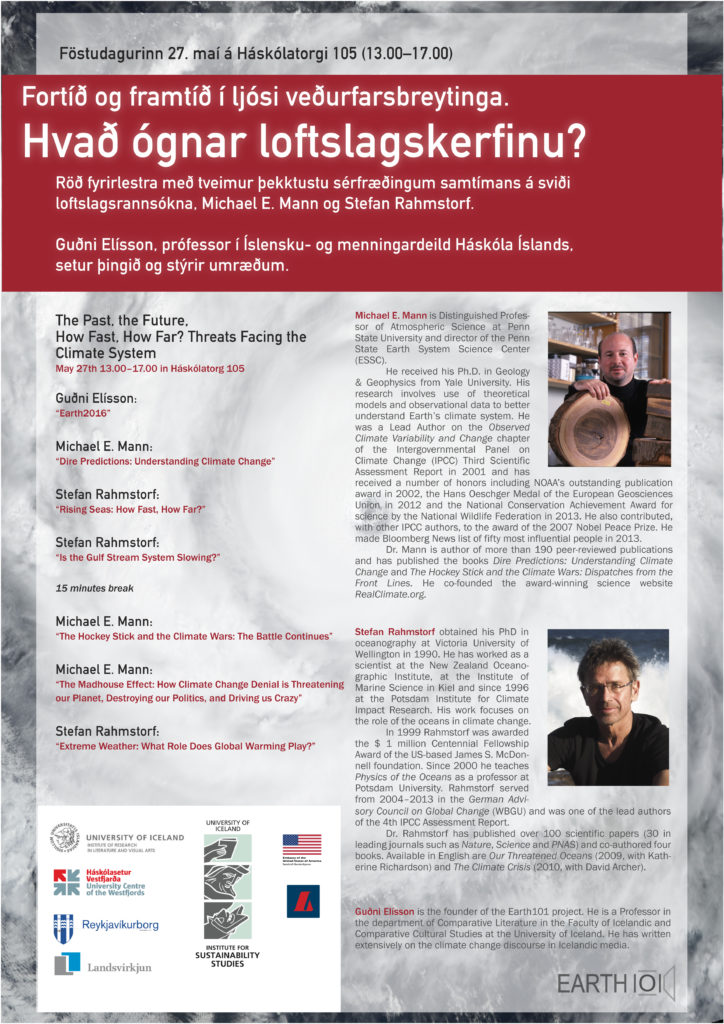
The Past, The Future. How Fast, How Far, threats facing the climate system
May 27th 13.00–17.00, in Háskólatorg (room HT-105), University of Iceland.
Lectures
Guðni Elísson: Earth2016
Michael E. Mann: Dire Predictions: Understanding Climate Change
Stefan Rahmstorf: Rising Seas: How Fast, How Far?
Stefan Rahmstorf: Is the Gulf Stream System Slowing?
Michael E. Mann: The Hockey Stick and the Climate Wars: The Battle Continues
Michael E. Mann: The Madhouse Effect: How Climate Change Denial is Threatening our Planet, Destroying our Politics, and Driving us Crazy
Stefan Rahmstorf: Extreme Weather: What Role Does Global Warming Play?
Climate scientists Michael E. Mann, Professor of Atmospheric Science at Penn State University and the director of the Penn State University Earth System Science Center (ESSC), and Stefan Rahmstorf, Professor of Physics of the Oceans at Potsdam University and the Potsdam Institute for Climate Impact Research, each present three different lectures on climate models, denial, extreme weather, sea-level rise and ocean current systems.
Guðni Elísson: Earth2016.
Michael E. Mann: Dire Predictions: Understanding Climate Change.
This lecture will begin with a review of the now-solid evidence for a human influence on the climate of recent decades. Such evidence includes instrumental measurements available for the past two centuries, paleoclimate observations spanning more than a millennium, and comparisons of the predictions from computer models with observed patterns of climate change. The lecture will then address future likely impacts of human-induced climate change including possible influences on sea level rise, severe weather, and water supply. The lecture will conclude with a discussion of solutions to the climate change problem.
Stefan Rahmstorf: Rising Seas: How Fast, How Far?
Sea-level rise is one of the inevitable results of global warming, as warmer ocean waters expand and land ice is melting and adding water to the oceans. Observations show that the seas are indeed rising, and that the rise in the 20th Century is unique in the context of the previous millennia. However, more difficult to answer is the question of how fast and how far sea level will rise in the future. The billion-dollar-question is: How stable are the ice sheets on Greenland and Antarctica?
Stefan Rahmstorf: Is the Gulf Stream System Slowing?
A slowdown or even collapse of the Gulf Stream System as a result of global warming has long been a concern of climate scientists and has fuelled the imagination of Hollywood. Regular direct observations of this giant ocean current system do not go back far enough to tell whether there is any long-term trend. However, in recent years indirect evidence is mounting for a remarkable slowdown over the 20th Century.
15 minutes break
Michael E. Mann: The Hockey Stick and the Climate Wars: The Battle Continues.
A central figure in the controversy over human-caused climate change has been “The Hockey Stick,” a simple, easy-to-understand graph my colleagues and I constructed to depict changes in Earth’s temperature back to 1000 AD. The graph was featured in the high-profile “Summary for Policy Makers” of the 2001 report of the Intergovernmental Panel on Climate Change (IPCC), and it quickly became an icon in the debate over human-caused (“anthropogenic”) climate change. I tell the ongoing story behind the Hockey Stick, using it as a vehicle for exploring broader issues regarding the role of skepticism in science, the uneasy relationship between science and politics, and the dangers that arise when special economic interests and those who do their bidding attempt to skew the discourse over policy-relevant areas of science. In short, I attempt to use the Hockey Stick to cut through the fog of disinformation that has been generated by the campaign to deny the reality of climate change. It is my intent, in so doing, to reveal the very real threat to our future that lies behind it.
Michael E. Mann: The Madhouse Effect: How Climate Change Denial is Threatening our Planet, Destroying our Politics, and Driving us Crazy.
I offer a somewhat lighthearted take on a very serious issue—the threat of human-caused climate change and what to do about it, based on my collaboration with Washington Post editorial cartoonist Tom Toles. We target the ongoing campaign to deny that threat through satire and where appropriate, ridicule, built around Tom Toles’ famously insightful, edgy, and provocative climate-themed cartoons in the Washington Post. Using Tom’s cartoons (existing ones and some new ones exclusive to the book) as a template, we review the scientific evidence of climate change, the reasons we should care, and the often absurd efforts by special interests and partisan political figures to confuse the public, attack the science and scientists, and deny that a problem even exists. Despite the monumental nature of the challenge this poses to human civilization, we find a way to end on an upbeat and cautiously optimistic note.
Stefan Rahmstorf: Extreme Weather: What Role Does Global Warming Play?
Humans have had to cope with extreme weather events throughout their history. However, the data show that the number of certain types of extreme events is on the rise in recent decades. For some types of extremes, such as heat waves, droughts and extreme rainfall events, this is an expected outcome of global warming. Other consequences have surprised climate researchers, such as changes in the jet stream and planetary waves in the atmosphere that have been linked to some unprecedented recent extreme events.
2015
Humanities and Climate Change
– Practicality, narratives and fuel
May 27th – University of Iceland, Reykjavik:
Karen Pinkus, professor of Italian and Comparative Literature at Cornell University, gives three short lectures in Háskólatorg on “The humanities and climate change: Against the practical”; “Climate change and narrative: Imaginative Failures, Possible Futures”; and “Thinking with Fuel”.
Professor Karen Pinkus is a member of the Advisory Board of the Atkinson Center for a Sustainable Future and a member of the Atkinson Center Climate Change Focus Group. Karen has published widely in Italian culture, literary theory, cinema, visual theory, and environmental theory.
Karen Pinkus began writing and teaching about climate change ten years ago. During that same period, general public awareness of the crisis has grown, while universities in the U.S. and elsewhere have placed ever more stress on the STEM fields (science, technology, engineering and math) and cut back on the humanities. Karen has become ever more convinced that the humanities—critical theory—must play a role in confronting what is the most wicked problem humans have faced. But humanists, she argues, are precisely misunderstood. They are often viewed as either “artists” (“you can create works to raise awareness of what is happening and appeal to emotions”) or “journalists” (“you can help translate our difficult science into legible prose to get people to act”) or “behaviorists” (“you can explain why people act the way they do and get them to change.”). In contrast, Karen advocates for the impractical humanities, for thinking about anthropogenic climate change as unique, not just another environmental issue, and not one that we can solve with better technology inserted into the same paradigms.
1. The humanities and climate change: Against the practical
In this talk Karen advocates for the humanities as crucial to confronting climate change, not because they have something practical to add to a mix of technological and policy solutions, but precisely in their impracticality, as critical theory that recognizes its own inadequacies with regard to the massive disruption that we are facing in the time now called the Anthropocene.
2. Climate change and narrative: Imaginative Failures, Possible Futures
Karen examines the new genre of “climate change fiction.” Yes, novelists have begun to address climate change as an issue, either in the present or projected into a (dystopian) future. But most of these narratives employ conventions and language that are entirely familiar. She suggests that our repetition of old embedded narratives, even in climate change fiction, demonstrates nothing less than a singular lack of imagination. This talk helps to unsettle or dislodge the idea that conventional realist fiction—even if set in a changed climate—is commensurate with the Anthropocene. Perhaps to truly be adequate to the massive temporal disruption of extracting and burning carbon built up over millions of years below the earth’s surface, we might better turn to ancient epic. Long before “the environment” was term to refer to “that which surrounds but is other than the human,” long before an explosion of population or the extraction of fossil fuels tied in a reciprocal knot with industrial production, texts such as The Odyssey or the Icelandic sagas exhibit the kind of temporal instabilities that might somehow be more appropriate for our times.
3. Thinking with Fuel
It might be enough to insist on the separation of fuel and energy just to get people to think; to draw our attention away from the machines and systems that are in place only because the future—with all of the compounded effects of climate change–might look radically different. In a recent study, a group of British scientists have quantified (in both monetary and purely physical terms) how much oil and coal already discovered would have to remain in the ground in order to avoid “catastrophic warming.” This study imagines not using over 90% of US and Australian coal as well as almost all of Canada’s oil sands (20 trillion dollars). Karen is convinced that critical theory puts this phenomenon of non-use into a crucial perspective: to leave fuel in the ground means to acknowledge that it exists, to have measured and studied it, to have invested money in research and development, leases, and so on. Leaving fuel in the ground, then, also means a special relationship to it that is not just non-consumerist, but is so complex that critical theory, taking into account its own failures to mastery the phenomena of the world, seems both necessary and ethically imperative.
2015

Hot Future, Cold War
Climate science and climate understanding
March 1st 13.00–17.00, in Háskólatorg (room HT-105), University of Iceland.
Lectures
Guðni Elísson: Earth2015
Gavin Schmidt: Simulating the emergent patterns of climate change
Erick Fernandes: Turn Down the Heat – Why a 4oC Warmer World Must be Avoided
Kevin Anderson: Delivering on 2°C: evolution or revolution?
Erik M. Conway: Merchants of Doubt: How Climate Science Became a Victim of the Cold War
Moderator: Halldór Björnsson
Gavin Schmidt is an expert in climate modeling who began his career at NASA GISS in 1996, and is now Director. His primary area of research is the development and evaluation of computer simulations of the Earth’s climate, and is particularly interested in how they can be used to inform decision-making. Schmidt received a bachelor’s degree in mathematics from Oxford University in 1988 and a doctorate inapplied mathematics from University College London in 1994. In addition to more than 100 published, peer-reviewed articles, he is the co-author of Climate Change: Picturing the Science (W.W. Norton, 2009), a collaboration between climate scientists and photographers. In 2011, he was awarded the inaugural American Geophysical Union Climate Communications Prize.
Erick Fernandes is an Adviser on Agriculture, Forestry & Climate Change at the World Bank and Co-Led the Bank’s Global Expert Team for Adaptation to Climate Change (GET-CCA). Erick is from a Kenya and grew up in the arid lands of northern Kenya, Ethiopia, and Somalia. He holds a BSc (Hons.) in Forestry from the University of Aberdeen (Scotland) and a PhD in Soil Science from North Carolina State University (USA). Prior to joining the Bank he
was an International Professor of Crop and Soil Sciences at Cornell University (USA) with research and teaching programs on tropical agroecosystems, hydrosheds, and natural resources. He also served as the Global Coordinator of the GEF-UNDP-CGIAR program on Alternatives to Slash and Burn Agriculture (ASB) and was a Principle Investigator in the NASA-sponsored, Large Scale Biosphere-Atmosphere (LBA-Eco) program. He has over 35 years of agriculture, forestry, and climate change experience in Africa, Asia, Latin America, and the Middle East and North Africa.
Kevin Anderson is Professor of Energy and Climate Change in the School of Mechanical, Aerospace and Civil Engineering at the University of Manchester. He is Deputy Director of the Tyndall Centre for Climate Change Research and is research active with recent publications in Royal Society journals and Nature. He engages widely across all tiers of government; from reporting on aviation-related emissions to the EU Parliament, advising the Prime Minister’s office on Carbon Trading and having contributed to the development of the UK’s Climate Change Act. With his colleague Alice Bows-Larkin, Kevin’s work on carbon budgets has been pivotal in revealing the widening gulf between political rhetoric on climate change and the reality of rapidly escalating emissions. His work makes clear that there is now little chance of maintaining the rise in global temperature at below 2°C, despite repeated high-level statements to the contrary. Moreover, Kevin’s research demonstrates how avoiding even a 4°C rise demands a radical reframing of both the climate change agenda and the economic characterisation of contemporary society. Kevin has a decade’s industrial experience, principally in the petrochemical industry. He is a commissioner on the Welsh Government’s climate change commission and is a director of Greenstone Carbon Management.
Erik Conway is a historian of science and technology residing in Pasadena, CA, currently employed by the California Institute of Technology. He studies and documents the history of space exploration, and examines the intersections of space science, Earth science, and technological change. Conway has co-authored two books with Naomi Oreskes on climate change, the Merchants of Doubt (2010), concerning the deliberate misrepresentation of climate change by a few high-level scientists, and The Collapse of ‘Western’ Civilization (2014), a science-based work of fiction that gives a critique of our present time from a future perspective.
Guðni Elísson is a Professor in the department of Comparative Literature in the Faculty of Icelandic and Comparative Cultural Studies at the University of Iceland. He has written extensively on the climate change discourse in Icelandic media.
Halldór Björnsson is Head of the Atmospheric Research Group at the Icelandic Meteorological Office (IMO)
2015
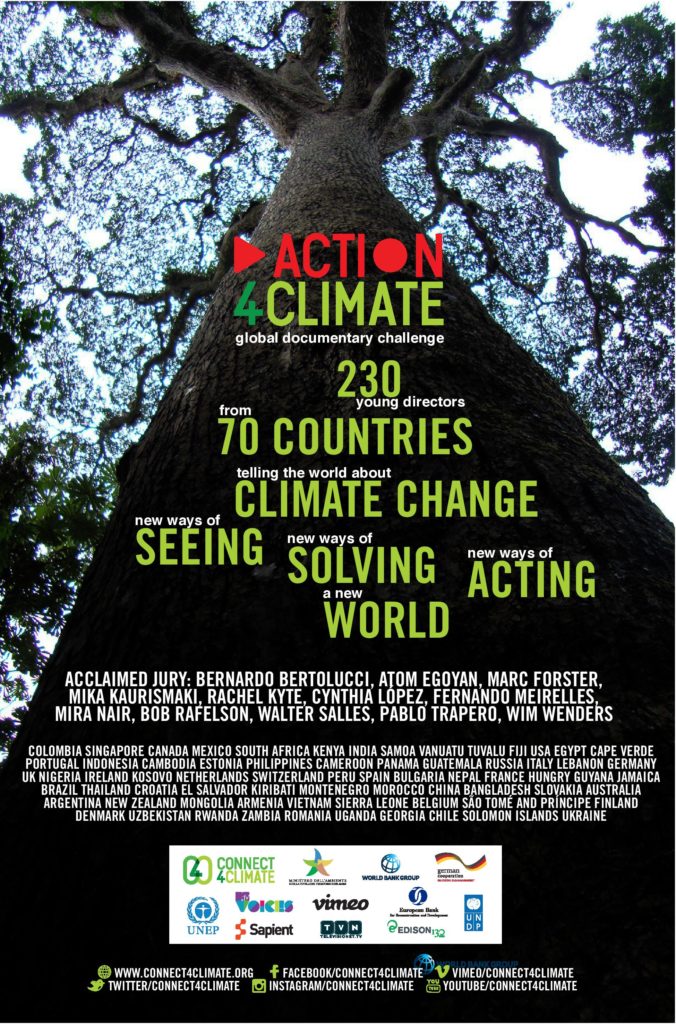
Action4Climate -Global Documentary Challenge Winners
February 27th 20.00–22.00, in Bíó Paradís, Reykjavík’s art-house cinema.
Admission for this screening/event is free.
Earth101, in further collaboration with Stockfish, European Film Festival in Reykjavik, presents the screening of prize-winning films from the Action4Climate project, a global documentary challenge, developed and supervised by the Connect4Climate campaign of the World Bank, followed by a panel discussion on the project and its results.
Representatives from the World Bank, Francis Dobbs and Erick Fernandes, will take part in panel discussions, along with Ellý Katrín Guðmundsdóttir, who is Reykjavik City’s CEO and Deputy Mayor, and climate specialists Kevin Anderson, Erik Conway, and Gavin Schmidt. Professor Guðni Elísson will be the moderator.
“We were amazed by the originality of the stories and the genuine concern shown by these young film makers about the effects of climate change. They described the effects of climate change from hundreds of different points of view. Selecting winners was an almost impossible task.”– Bernardo Bertolucci
Further information on the panel participants:
Kevin Anderson is professor of energy and climate change in the School of Mechanical, Aeronautical and Civil Engineering at the University of Manchester. Anderson recently finished a two-year position as director of the Tyndall Centre, the UK’s leading academic climate change research organisation.
Ellý Katrín Guðmundsdóttir is Reykjavik City’s CEO and Deputy Mayor. She is a lawyer by training with Master’s Degree in Environmental and International Law from the University of Wisconsin, USA. Ms. Gudmundsdottir served as a counsel at the World Bank in Washington, DC 1998-2002 where she i.a. co-authored the book Legislating Sustainable Fisheries.
Erik Conway is a historian of science and technology residing in Pasadena, CA, currently employed by the California Institute of Technology. He has co-authored two books with Naomi Oreskes on climate change, the Merchants of Doubt (2010) and The Collapse of ‘Western’ Civilization (2014).
Francis Dobbs is a British citizen who worked in UK television and independent film production before moving to the World Bank Group media division 25 years ago. At the World Bank he ran a small production unit producing a variety of videos on development issues and television documentary co-productions, before joining Connect4Climate to undertake communications projects on climate change and climate action.
Guðni Elísson is a Professor in the department of Comparative Literature in the Faculty of Icelandic and Comparative Cultural Studies at the University of Iceland. He has written extensively on the climate change discourse in Icelandic media.
Erick Fernandes is an Adviser on Agriculture, Forestry & Climate Change at the World Bank and Co-Led the Bank’s Global Expert Team for Adaptation to Climate Change (GET-CCA). He holds a PhD in Soil Science from North Carolina State University.
Gavin Schmidt began his career at NASA GISS in 1996, and is now Director. His primary area of research is the development and evaluation of computer simulations of the Earth’s climate, and is particularly interested in how they can be used to inform decision-making.
2015
Merchants of Doubt – Screening and Q&A with Erik Conway
February 26th 20.00–22.00, in Bíó Paradís, Reykjavík’s art-house cinema.
Earth101, in collaboration with Stockfish, European Film Festival in Reykjavik, presents the special screening of Robert Kenner’s shocking documentary Merchants of Doubt followed with a Q&A session with Professor Erik Conway, co-author, with Naomi Oreskes, of the famous book criticizing the deliberate production of misleading knowledge on climate change by stakeholders in the fossil fuel industry.
The film concerns itself with the denial industry in the United States, how a group of individuals funded by U.S. corporations has in recent decades systematically worked at derailing the discussion on various important subjects, from tobacco smoking to the threat of climate change.
Erik Conway will be present to take questions from the audience after the screening along with Kevin Anderson and other climate specialists. Guðni Elísson will be the moderator of the panel discussions. Conway is a historian of science and technology residing in Pasadena, CA, currently employed by the California Institute of Technology. He studies and documents the history of space exploration, and examines the intersections of space science, Earth science, and technological change. In addition to the Merchants of Doubt he has also written the co-written with Oreskes The Collapse of ‘Western’ Civilization (2014), a science-based work of fiction that gives a critique of our present time from a future perspective.
Robert Kenner is a documentary filmmaker who has worked for The National Geographic and PBS and was nominated for an Oscar for Best Documentary for 2010s Food, Inc. A film that Variety claimed “does for the supermarket what Jaws did for the beach.”
Film reviews:
“The film doesn’t just highlight the ingenuity of the sceptics. It also underlines how feeble thescientific community has been at standing up for itself.”
Geoffrey Macnab, The Independent.
“Unravelling the myriad methods through which ideology consistently trumps evidence (we see what we believe, not vice versa), […] explaining how carnival-huckster showmanship has been used to make hard-and-fast scientific evidence of man-made global warming disappear before our very eyes.”
Mark Kermode, The Guardian
Book reviews:
“Oreskes and Conway paint an unflattering picture of why some scientists continue to stand against the overwhelming scientific consensus on issues at the center of public discussion.”
USA Today
“[A] fascinating and important study…Merchants of Doubt deserves a wide readership. It is tempting to require that all those engaged in the business of conveying scientific information to the general public should read it.”
Science
“With exhaustive detail Oreskes and Conway relate the history of how industries and special interests in the United States have confused the populace and government in order to protect profits and ideology at the expense of American’s health and the quality of the environment.”
San Francisco Book Review
2015
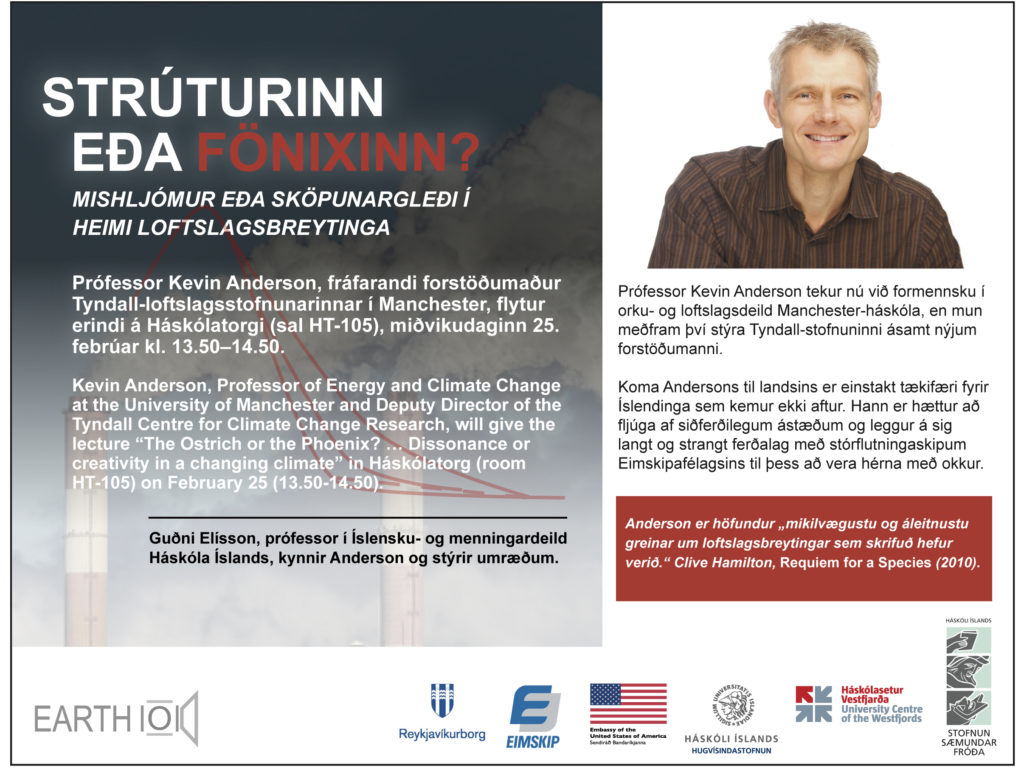
The Ostrich or the Phoenix? – Dissonance or creativity in a changing climate
February 25th 13.50–14.50, in Háskólatorg (room HT-105), University of Iceland.
Kevin Anderson, Professor of Energy and Climate Change at the University of Manchester and former Director of the Tyndall Centre for Climate Change Research will lecture on the topic of confronting climate change in Háskólatorg (room HT-105) on February 25 (13.50-14.50).
Anderson’s lecture addresses the problematics of framing climate change in a vague manner. Many scientists and policy-makers continue to claim that to contain the global increase in mean surface temperature at or below “2°C is not only possible but achievable without sacrificing the benefits of economic growth and rising prosperity”, but Anderson argues “it is difficult to envisage anything other than a planned economic contraction being compatible with 2°C, 3°C and increasingly 4°C futures”.
We face a profound paradigm shift, triggered ostensibly by climate change. Such a fundamental transition leaves society with three clear choices. To continue the delusion that climate change can be addressed adequately through rhetoric, financial fine-tuning and piecemeal incrementalism; to interpret such conclusions as a message of despair and futility; or to acknowledge that “at every level the greatest obstacle to transforming the world is that we lack the clarity and imagination to conceive that it could be different”, and that through immediate harnessing of human will and ingenuity we can yet deliver relatively low-carbon, climate-resilient and prosperous communities.
Kevin Anderson has not only been the director of one of the most prestigious climate change institutions in the world, he is also, in the words of philosopher Clive Hamilton, along with Alice Bows, the author of “the most important and confronting paper on climate change”. Hamilton has also named Anderson “the scariest man on the planet”, but at the same time stating that “we must be grateful for his unblinking honesty and compassion.”
Anderson has made the ethical decision to quit using air transport, so he will be travelling to Iceland by sea. It is a great honor for Earth101 to have him come to Iceland in order to present his lecture.
2015
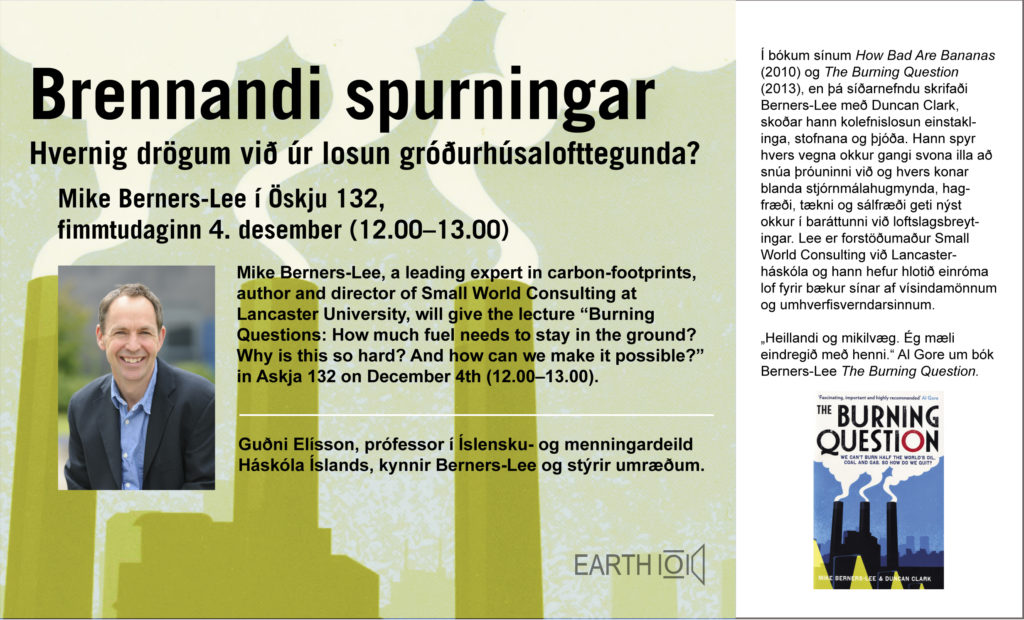
Burning Questions & What is to be done? Defining the climate change problem.
Two lectures given by Mike Berners-Lee, the author of The Burning Question (2013) and How Bad Are Bananas (2010), leading expert in carbon-footprints and director of Small World Consulting at Lancaster University.
Burning Questions: How much fuel needs to stay in the ground? Why is this so hard? And how can we make it possible?
Emissions from energy use have been rising exponentially for at least 160 years. So far the world’s talk and action on climate change has produced no detectable deviation in this long-term trajectory. Why haven’t innovation, efficiency or renewables helped us yet? Why haven’t personal, local or national targets made any difference? Where will the curve take us if it continues? Is deliberate intervention really necessary? And if so what blend of politics, economics, technology and psychology will make this possible? Drawing on Mike Berners-Lee and Duncan Clark’s book, The Burning Question, Mike explores the macro dynamics of the energy system.
2014
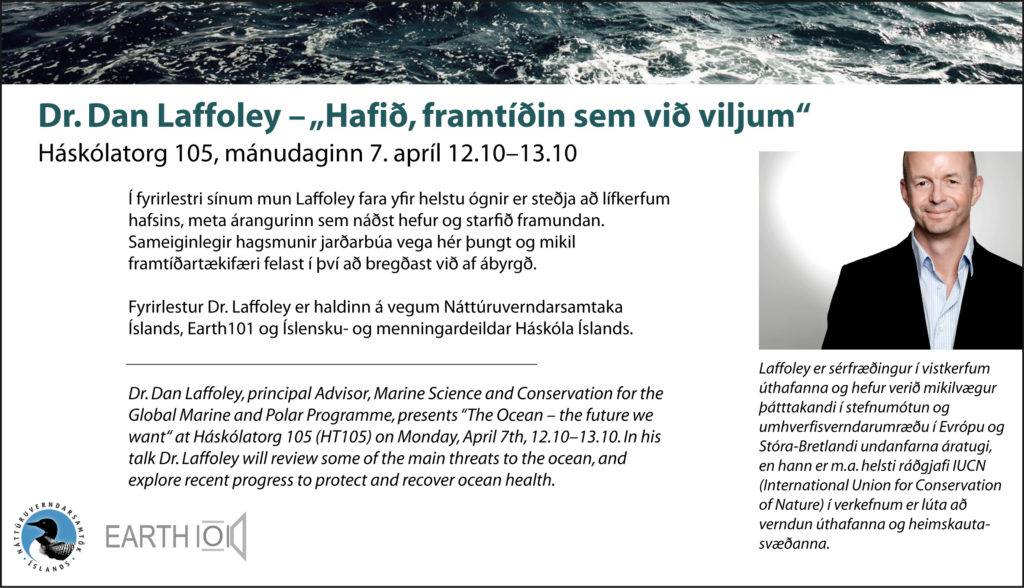
The Ocean – the future we want
A lecture given by Dan Laffoley the Principal Advisor on Marine Science and Conservation for IUCN’s (International Union for Conservation of Nature) Global Marine and Polar Programme and also acts as Marine Vice-Chair for the World Commission on Protected Areas.
2013

Climate Science and Climate Communication
The first Earth101 Click to enlarge.conference with lectures from Stefan Rahmstorf, oceanographer, climatologist and Department Head of the Potsdam Institute for Climate Impact Research; Michael Mann, physicist, climatologist and director of the Earth System Science Center at Pennsylvania State University; Kari Norgaard, Associate Professor of Sociology and Env. Studies at the University of Oregon and author of Living in Denial; Peter Sinclair, author of “Climate Denial Crock of the Week”and Guðni Elísson the director of Earth101 and Professor in the department of Comparative Literature at the University of Iceland.
2013
The lectures shared here were given on October 5th 2013 in the following order:
Guðni Elísson: “Earth101”
Stefan Rahmstorf: “The Climate Crisis”
Michael Mann: “The Hockey Stick and the Climate Wars”
Kari Norgaard: “Living in Denial: Climate Change, Emotions and Everyday Life”
Peter Sinclair: “Communicating Climate Science in the Disinformation Era”
Recorded by Phil Coates and edited by Ryan Chapman.
2013
In his lecture “The Cimate Crisis”, professor Stefan Rahmstorf explains how, since the start of the industrial age, the carbon dioxide content of the atmosphere has risen to the by far highest value of the last million years. At the same time, global average surface temperatures have increased by 0.8°C. This warming is continuing unabated: 2010 was, followed by 2005, the hottest year on record since global measurements began more than 130 years ago. The ice cover on the Arctic Ocean is shrinking rapidly and reached a record low value in September 2012. The huge ice sheets both in Greenland and Antarctica are losing mass at an increasing rate, as satellite data show. This contributes to the accelerating rise of sea levels, which rose at a rate of one centimeter per decade at the beginning of the 20th Century, but have been rising at over three centimeters per decade for the past twenty years. The last decade has witnessed a sequence of unprecedented weather extremes, including the 2010 Russian heat wave, the flooding in Pakistan that same year, and the 2012 summer heat wave in the US. To prevent unmanageable climate change, humanity can still limit global warming to a maximum of 2°C – but only if decisive and rapid action is taken to transform our energy system.
2013
The Hockey Stick and the Climate Wars: Dispatches From The Front Lines
“The Hockey Stick” has been a central figure in the controversy over human-caused (“anthropogenic”) climate change. It is an easy-to-understand graph Michael E. Mann and his colleagues constructed to depict changes in Earth’s temperature back to 1000 AD. The graph was featured in the high-profile “Summary for Policy Makers” of the 2001 report of the Intergovernmental Panel on Climate Change (IPCC), and it quickly became an icon in the debate over human-caused climate change. In his lecture, professor Mann tells the story behind the Hockey Stick, using it as a vehicle for exploring broader issues regarding the role of skepticism in science, the uneasy relationship between science and politics, and the dangers that arise when special economic interests and those who do their bidding attempt to skew the discourse over policy-relevant areas of science. In short, he attempts to use the Hockey Stick to cut through the fog of disinformation that has been generated by the campaign to deny the reality of climate change and reveal the very real threat to our future that lies behind it.
2013
In her lecture, professor Kari Norgaard uses interviews and ethnographic data from a community in western Norway during the unusually warm winter of 2000-2001 to describe how knowledge of climate change is experienced in everyday life. Stories in local and national newspapers linked the warm winter explicitly to global warming. Yet residents did not write letters to the editor, pressure politicians, or cut down on the use of fossil fuels. Norgaard describes the disturbing emotions of guilt, helplessness and fear of the future that arose when people were confronted with the idea of climate change – and then builds a model of socially organized denial to describe how people normalized these disturbing emotions through the deployment of conversation norms and discourses that served as “tools of social order.” Using literature from sociology of emotions, environmental sociology and sociology of culture, she describes “the social organization of climate denial” through multiple levels, from emotions to cultural norms to political economy.
2013
Videographer Peter Sinclair has created more than one hundred YouTube videos that are used in universities around the world to show the discoveries of climate science, and how organized climate denial campaigns attempt to mislead the public. Mr. Sinclair describes his process of learning from and interacting with leading scientists to better communicate what their research is showing. The presentation includes powerful images and animations, which illustrate the scope of global change, what scientists are saying about it, and what citizens can do if they want to begin dealing with this critical global issue.
2013
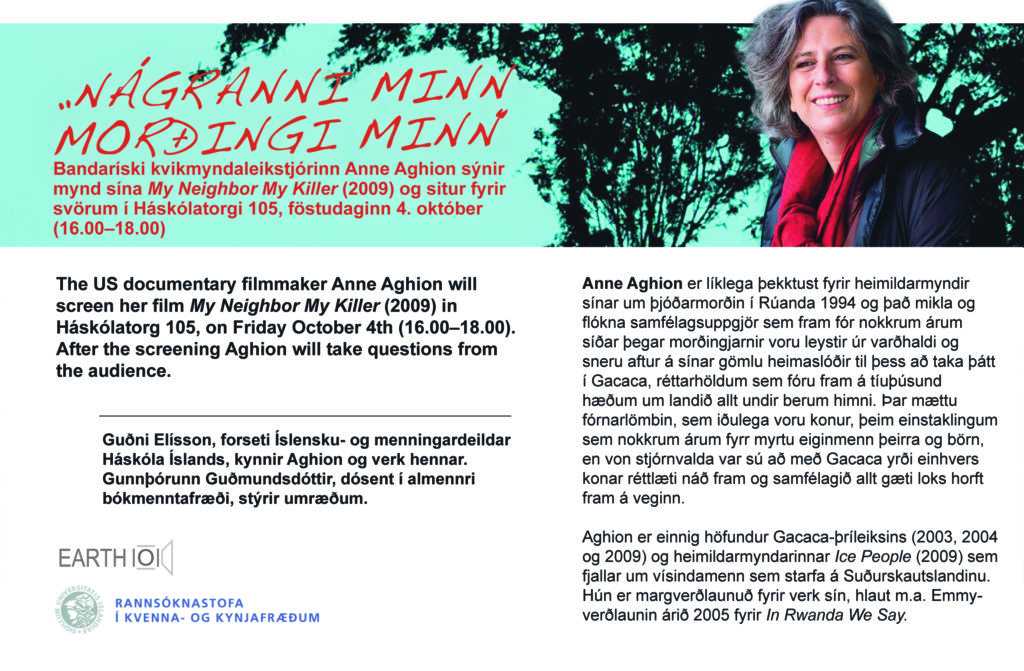
My Neighbor My Killer
A screening of Anne Aghion’s documentary My Neighbor My Killer on the people of Rwanda attempting to reconcile after the genocide. Aghion was present for a Q&A session afterwards.
2013
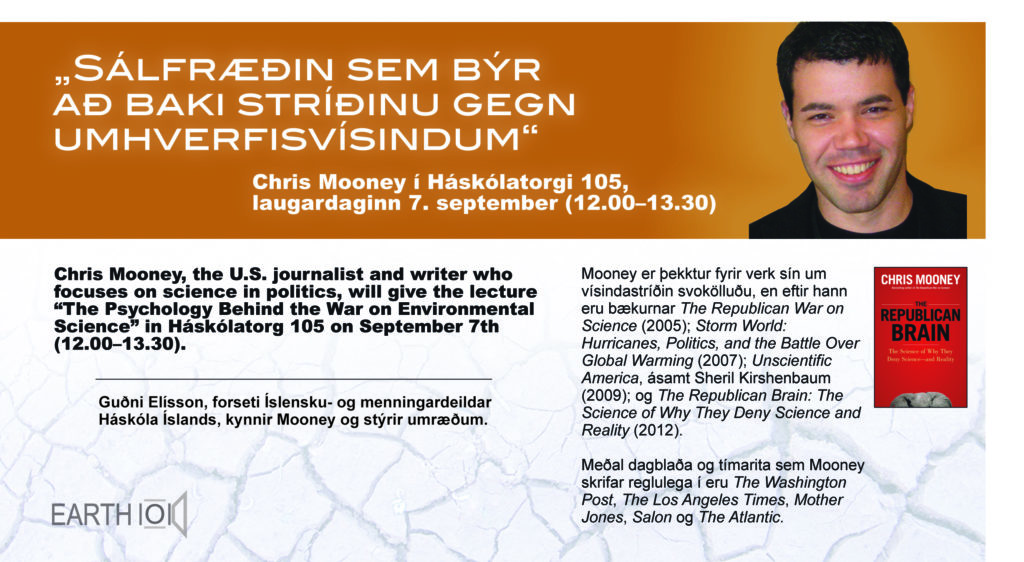
The Psychology Behind the War on Environmental Science
A lecture given by Chris Mooney, U.S. journalist and writer who focuses on science in Politics. He is the author of The Republican Brain (2012), Storm World (2007), The Republican War on Science (2005) and co-author of Unscientific America with Sheril Kirshenbaum. Chris Mooney writes for The Washington Post, The Los Angeles Times, Mother Jones, Salon and The Atlantic.

